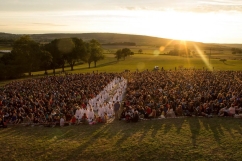The middle of January may seem like a strange time to be thinking about a wedding. Sure, some people have winter weddings, but in my mind, a wedding is synonymous with the summer months. A chance to take advantage of long evenings, photos in gardens in full bloom and the celebratory atmosphere that a day of sunshine provokes.
Nevertheless, this Sunday, many churches whose congregations have battled through rain, wind and snow and everything else the northern hemisphere's winter can throw, will hear the story of one of the most famous weddings of all – The Wedding at Cana.
Weddings hold a special place in literary history. Think of the other accounts in the Bible for instance – the imagery in Revelation of a wedding feast or Jesus' parable of the King killing the fatted calves for a wedding celebration.

It's not just in the Bible either. Wedding stories have a hold over our imagination, whether the jilted Miss Havisham of Dickens' Great Expectations, the hedonistic 90s protagonists of Four Weddings and a Funeral, or indeed the most significant and controversial episode of Game of Thrones – the Red Wedding.
But the Wedding at Cana is far more than just a literary trope. It's famous for being the first of the miracle accounts of Jesus' life recounted in the Gospel of John. The turning of the water into wine when it looked like the wedding party was about to fall flat on its face.
What's the significance of this gospel story and what does it tell us about the Kingdom of God? There are many lessons we can draw, but three in particular make it such an extraordinarily rich account... It's firstly about revelation, secondly about extravagance and thirdly about victory.
This gospel reading is used in the season of Epiphany. The word epiphany simply means 'revealing.' So, in the season of Epiphany we hear the stories of how God has chosen to reveal Himself to us. The first account is that of the Magi following the star to Bethlehem and bringing gifts to Jesus. What the star reveals to them is that they are to see the King of the Jews. This is the revealing of Jesus as the Messiah to the gentiles.
The second gospel account we have in this season of Epiphany is Jesus' baptism in the River Jordan. This is an account of the revelation of Jesus to the people of God. When John the Baptist is anticipating Jesus' arrival, he says, "But after me comes one who is more powerful than I, whose sandals I am not worthy to carry." (Matt: 3:11) When Jesus appears out of the water, a voice from heaven says, "This is my Son, whom I love; with him I am well pleased." This is Jesus is being revealed as the Messiah to the Jewish people.

Similarly, the story of the Wedding at Cana is a story of revelation. Placed very near the beginning of John's Gospel, it is his way of proclaiming who Jesus is. Yes, he is the light to the Gentiles (Magi), yes he is the Jewish Messiah (Baptism), but more than that – he is God.
The miracle of the water being turned into wine at the wedding feast is a key part of John's revelation of who Jesus is. As Fr Raniero Cantalamessa puts it, "To simple shepherds he sends an angel; to the wise who scrutinize the courses of the heavenly bodies he sends a star; to the Jews attached to signs, he gives a sign, that is, a miracle: he changes water into wine."
So the first meaning of the Wedding story is revelation. The second is extravagance. This is a hallmark of the Kingdom of God, that Jesus points to on many occasions, but never more so than the Wedding at Cana.
The party is in full swing and the celebration of the marriage is going well. Then, disaster strikes. They've run out of wine. So Jesus steps in. But he doesn't merely avert the disaster. Instead he produces wine of an astounding quality, in great quantity. This is above and beyond the call of duty.
Commenting on this story NT Wright says, "The six stone jars John speaks of would together hold about 150 gallons, that is, about 800 bottles' worth. Sounds like quite a party. In fact, it's a bit like the picnic in the desert four chapters later, when Jesus feeds the crowds out of next to nothing and they find twelve baskets of bits and pieces left over." The former Bishop of Durham goes on, "This is all about God's lavish provision, God's generous overflowing love, the glory of heaven filling the earth as the waters cover the sea."
The Kingdom of God isn't merely about saving face, making sure things are OK, and that the bride and groom 'get away with it.' No, the Kingdom is about the extravagant love and provision of God. The Kingdom – of which we can have a small taste now – is generous beyond our comprehension.
So, the story is about revelation and about extravagance. But it's also about victory. The former Archbishop of Centerbury Dr Rowan Williams describes this first miracle at Cana, "There he revealed his glory, he made his glory to be seen. And his disciples believed in him, his disciples trusted him. They see what's going on and something connects."
The disaster that would have befallen the family of the couple getting married if the party had been a flop was obvious. This was THE social event on the calendar. If the wine ran out, they'd be forever known for arranging the 'damp squib wedding.' From this losing position, Jesus produces a triumph – wine better than anyone has tasted!
As Richard Baukham says, these first few chapters of John are a prefiguring of the cross – and the victory that comes there. He says, "It is characteristic of John's Gospel that the whole narrative builds towards and foreshadows Jesus' 'hour,' the hour when He is lifted up on the cross and His glory is made known."
The Revd Lucy Winkett says this story of a wedding snatched from disaster by Jesus is especially poignant in a world which seems to be falling apart in the 21st Century. The Rector of St James Piccadilly says, "this story about Jesus at a wedding is showing us a world that we can hardly imagine; where the forces of death, of terror, of trivialisation, of cruelty, of isolationism, the forces that seduce human beings into believing that we are autonomous, omnipotent, these forces have been defeated."
This great story takes up only 12 verses at the beginning of John's Gospel. Yet the significance of what's packed into those 12 verses can't be underestimated. We learn about God's revelation of himself in Jesus. We learn (and taste?) of the extravagance of the Kingdom of God and we learn of God's eventual victory, despite our circumstances, and the depressing state of the world. We also learn that Jesus likes weddings very much. Also, for that matter, he likes a party!
















